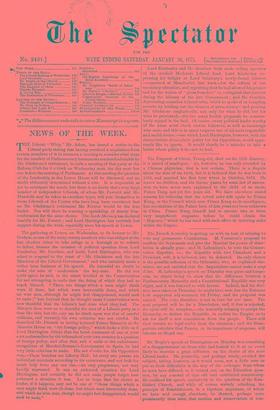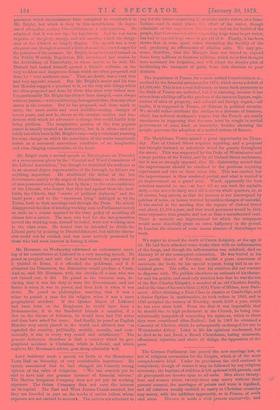Mr. Bright's speech at Birmingham on Monday was something of
a disappointment to those who had looked to it as an event likely to exercise a great influence on the choice of the next Liberal leader. He pointedly, and perhaps wisely, avoided the subject, taking, however, as it would seem, not a little care to put no fresh difficulties in the way of the colleague from whom he must have differed, as it turned out, on the Education ques- tion, by any renewal of that old and embittered controversy. He confined his speech exclusively to the question of the Esta- blished Church, and while of course warmly attacking the principle of Establishment, in a vigorous argument, of which we have said enough elsewhere, he showed, perhaps more prominently than ever, that caution and conservatism of ;tem-
perament which circumstances have conspired to overshadow in Mr. Bright, but which is deep in him nevertheless. He depre- cated altogether making Disestablishmeut a test-question. He admitted that it was not ripe for legislation. And he was warm in praise of the piety, energy, and self-sacrifice which the clergy- men of the Church so largely display. The speech was a very eloquent one, though it seemed a little abstract to a crowd eager for the polemics of the moment. Mr. Bright, in an incidental remark on the Public Worship Regulation Bill, introduced last session by the Archbishop of Canterbury, to whose apron, as he said, Mr. Disraeli had tacked himself, quoted a friend's criticism on the very reckless and dangerous things which are often proposed and done by "very moderate men." That, no doubt, was a very true and very apposite remark. But Mr. Bright's career and his tone last Monday suggest a pendant to it, on the very safe things which are often proposed and done by those who seem very violent men. Unquestionably Mr. Bright has oftener been charged,—not always without justice,—with embittering class against class, than any other orator in the country. But he has proposed, and done much to carry, the most stable and most stability-causing changes of recent years, and now he shows us the extreme caution and ten- derness with which he advocates a change that could hardly help being perilous. The imaginative passion of the true popular orator is usually treated as destructive, but it is often—and cer- tainly has often been in Mr. Bright's case—only a vehement yearning for some change on which the conscience of the orator tenaciously insists as a necessary antecedent condition of an imaginative and even clinging conservatism of the heart.



































 Previous page
Previous page